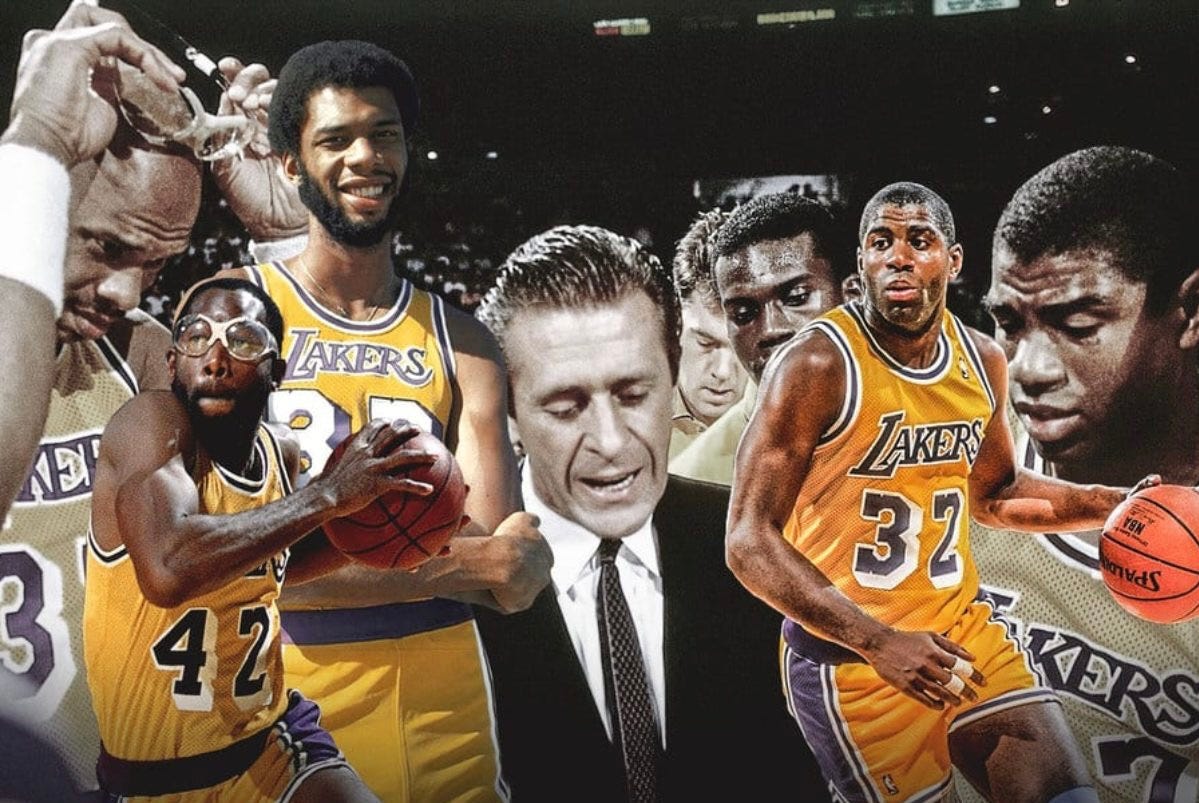"Winning Time" Isn’t Just Deliberately Dishonest, It’s Drearily Dull
How did so many talented people go so terribly wrong?
A lot of people have been asking me if I’ve seen the HBO series Winning Time: The Rise of the Lakers Dynasty. Actually, I had no real interest in watching the show, not because of any negative feelings about being exploited, but because I’d already lived through it. I know exactly what happened. To watch 10 hours of someone else’s interpretation seemed like a waste of my time. For me, the show would be excruciatingly familiar like being interviewed by Chris Farley in the famous Saturday Night Live skit when he asked Paul McCartney questions like, “Remember when you were with the Beatles?” However, after hearing some angry grumblings in the pop culture ether about misrepresentation and outright lies, my journalistic curiosity took over and I sat down to watch.
Before I get to my opinion, we’ll need to clear up two things.
First, my response to the show has nothing to do with how I’m portrayed, the details of which I’ll discuss later. I’m 75, folks, and have been dealing with positive and negative descriptions of me for 55 years and I long ago accepted that it’s just part of the celebrity gig. There’s very little that anyone can say about me—whether it’s true or false—that will affect my life. Especially in a TV show. I don’t get mad if someone wants to portray me as basically a T-800 Terminator robot. My record as a college and NBA player and my lifetime commitment to social justice is enough for me.
Second, I’m not a stickler for everything being factual when doing a fictionalized account of historical events. One of my favorite shows is The Great, a historical dramedy about Catherine the Great, Empress of Russia. Nearly nothing is factual, which the show’s creators remind us with their onscreen title: The Great: An Almost Entirely Untrue Story. Sometimes writers must take dramatic license in order to convey a deeper truth. I’ll also discuss this in more detail later.
To recap: My reaction to Winning Time is not related to how I’m portrayed nor to a need for a factual account of those years. Now, let’s dig in.
Before we dig in, a reminder that this is a subscription-based newsletter that continues to exist because of reader support. So, if you like what I write, subscribe, share, comment. But mostly subscribe.
The Sin of Being Boring
There is only one immutable sin in writing: Don’t Be Boring! Winning Time commits that sin over and over.
That surprised me because Adam McKay is one of the producers and he directed the first episode. Anyone familiar with McKay’s work (The Big Short, Vice, Don’t Look Up) can see his stylistic influence in the entire series. I generally am a fan of McKay’s work—The Big Short and Vice are wonderful—except for the bloated and obvious Don’t Look Up (which I critiqued here). I thought the poor quality of Don’t Look Up was an anomaly. I hoped that perhaps because he was overwhelmed by his passion about global warming, he let his commitment overshadow his critical eye. But now that Winning Time suffers from some of the same shallowness and lazy writing, I’m not so sure.
I’ll start with the bland characterization. The characters are crude stick-figure representations that resemble real people the way Lego Hans Solo resembles Harrison Ford. Each character is reduced to a single bold trait as if the writers were afraid anything more complex would tax the viewers’ comprehension. Jerry Buss is Egomaniac Entrepreneur, Jerry West is Crazed Coach, Magic Johnson is Sexual Simpleton, I’m Pompous Prick. They are caricatures, not characters. Amusement park portraits that emphasize one physical feature to amplify your appearance—but never touching the essence.
The result of using caricatures instead of fully developed characters is that the plot becomes frenetic melodrama, sensationalized invented moments to excite the senses but reveal nothing deeper. It’s as if he strung together a bunch of flashing colored lights and told us, “This is the spirit of Christmas.”
How was the plot constructed? If you gathered the biggest gossip-mongers from the Real Housewives franchise and they collected all the rumors they heard about each other from Twitter and then played Telephone with each other you’d have the stitched together Frankenstein’s monster that is this show. I was shocked that for all the talent and budget, the result was so lacking in substance and humor.
Humor is one of Adam McKay’s specialties, but he can’t seem to find any in this show. There are attempts, but they often fall flat because they are so obvious and predictable. Those bro-dude attempts are as cringy as a bad SNL skit.
He uses the technique of breaking the fourth wall in order to have the characters directly address the audience. The only reason to do this is to get humor or give insight, as it does in his The Big Short and other films such as Annie Hall, Ferris Bueller’s Day Off, Deadpool, and the TV show Fleabag. But in Winning Time, it’s neither funny nor insightful, mostly just giving us information.
It never held my interest enough for me to care, let alone be outraged.



